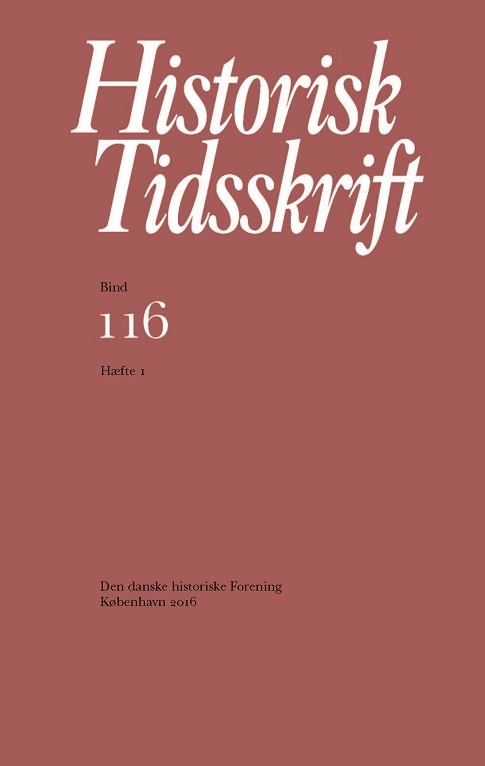Forliset i Korst-udvalget. Erhvervsorganisationerne og samarbejdspolitikken 1940-41
DOI:
https://doi.org/10.7146/ht.v116i1.56804Resumé
The Failure of the Korst Committee. Danish Business Organisations and the Danish Collaboration with Germany 1940-41
Following the German occupation of Denmark, a new Danish government was formed on 8 July 1940. The long-serving leader of the Social Democratic Party, Thorvald Stauning, continued as Prime Minister while a new Foreign Minister, Erik Scavenius, was appointed. Immediately after taking office, the new government issued a declaration that signaled a willingness to enter into close collaboration with Germany. After having received the declaration, Germany proposed a treaty that would entail the formation of a German-Danish customs and currency union, involving the free movement of goods and people between the two countries and an irrevocably fixed exchange rate between the German Reichsmark and the Danish Krone. After fierce discussions in the Danish government, the German proposal was turned down in August 1940. During these discussions, powerful Danish business organizations – especially the Danish Council of Agriculture and the Danish Federation of Industries – were strongly against forming a customs and currency union with Germany. Historians have debated why the Danish business organizations were against a German-Danish customs and currency union. The article demonstrates that the opposition was due to national and political reasons. The business organizations found that the union would involve a loss of Danish independence. They further considered it unwise to enter into formal agreements with Germany before the end of the war because this might be seen as Denmark having sided with Germany. It is demonstrated in the article that Danish agriculture in particular might have received economic benefits from the formation of a customs and currency union with Germany, but this was seen as less important by the Danish business organizations than the loss of Danish independence and the risk of being seen as an ally to Germany. After having turned down the proposed customs and currency union, the Danish government exerted pressure on the business organizations to participate in a working group that would analyze the consequences of the customs and currency union and possibly suggest other forms of German-Danish economic collaboration. The business organizations reluctantly agreed to participate in the working group in order not to create problems for the Danish government in its relationship with Germany but emphatically declined to change their opposition to the idea of a customs and currency union and other formal economic arrangements before the end of the war. The article focuses on the work in the working group, which has become known as the Korst Committee after its chairman, Knud Korst. It is demonstrated that the Danish business organizations, in spite of the German victories in the first half of 1941, maintained their opposition to a formal economic collaboration with Germany before the end of the war. During its discussions, the working group evolved into a forum that would consider the economic consequences for Denmark in the case of a German victory in World War II. In regard to this question, the working group never reached any kind of substantive conclusions and never reached a final conclusion. In June 1941, after the German invasion of the Soviet Union had created new uncertainties about the outcome of the war, the Danish Federation of Industries declined to participate in further policy discussions and the working group quietly ended its work.
Downloads
Publiceret
Citation/Eksport
Nummer
Sektion
Licens
Ophavsret til bidrag i Historisk Tidsskrift tilhører forfatterne og Den danske historiske Forening som udgiver af Historisk Tidsskrift. For illustrationer gælder den ophavsret, som står anført i billedteksten. Ophavsretslovens almindelige bestemmelser gælder, hvilket vil sige, at ophavsretten gælder i 70 år efter forfatterens død. Bidrag i Historisk Tidsskrift må derfor, med forbehold for en ”moving wall” på tre år, frit downloades, læses, gemmes, anvendes og citeres (med kildeangivelse) i privat og videnskabelig sammenhæng, men de må ikke helt eller delvis genudgives af tredjepart, heller ikke i redigeret form, uden tilladelse fra forfatterne og Den danske historiske Forening. Henvendelse skal i så fald rettes til Historisk Tidsskrifts redaktion på histtid@hum.ku.dk.





